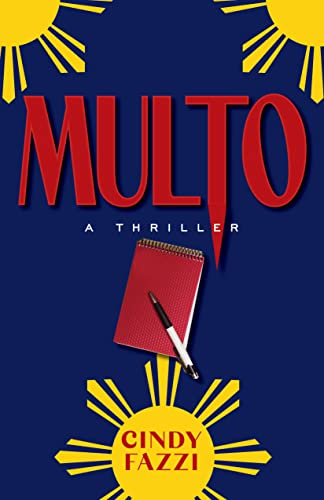I wrote Monica’s character because there are thousands like her in the Philippines—biracial Filipinos who are a direct result of the presence of U.S. military bases…. They’re usually born out of wedlock and left behind by their American fathers. They feel they don’t truly belong in the Philippines but they certainly don’t belong in the United States either.
I am always looking for stories that transcend the usual conventions of genre, and Cindy Fazzi’s Multo (Agora/Polis Books, 2023) is a novel in the tradition of the thriller genre like no other. It eschews all that we have come to expect from clichéd mystery vehicles, and presents us with a new type of anti-hero. At its heart is a new kind of hardboiled noir.
Multo tells two stories: one is of the Filipino-American bounty hunter Domingo who hunts undocumented immigrants. The other is the story of Monica, who is Domingo’s greatest challenge, and as he hunts her, he questions his own motives and commonality with the hunted.
In a sea of noisy techno-thrillers and flavorless stalking murderers, Cindy Fazzi uses a simple premise to establish her new genre. I was fortunate enough to catch up with Cindy and ask some questions about her thrilling new novel.
It is always interesting to hear what motivates and inspires writers. Can you tell me who your influences are including your earliest literary or cinematic heroes?
In terms of motivation, I write fiction because I want to introduce readers to Filipino American characters. Walter Mosley, one of my favorite authors, said that if you can’t find your people in fiction, then they don’t exist. That’s why I write–to add to the existing Filipino American literature, which is very meager. In terms of influences, I love Patricia Highsmith, esp. Strangers on a Train, in addition to Walter Moseley (Devil in a Blue Dress). In film, it’s Alfred Hitchcock, hands down. When I was a college student in Manila, I was obsessed with Hitchcock. My favorite Hitchcock film is The Rope. I think Francis Ford Coppola’s The Conversation, starring Gene Hackman, is truly underrated. Another Gene Hackman film I love is The French Connection by William Friedkin.
How has being a news reporter helped you write Multo?
Journalism is a great background to have. It taught me to write succinctly, how to ask the right questions, and how to find the information I need to write a novel. When I wrote MULTO, I knew nothing about bounty hunting. But I found a nonfiction book called Bail Enforcer: The Advanced Bounty Hunter by Bob Burton, a well-known bounty hunter and an advocate for the profession. It taught me the nuts and bolts of bounty hunting.
What might you say to people who have a preconception about the “thriller” genre? Is this a crime fiction novel?
MULTO is both a thriller and a crime novel. A prerequisite for a thriller is a sense of racing against time. In this case, there’s Mary Reed who’s dying and wants to see her stepdaughter, Monica, before she dies. Later in the book, Domingo realizes Monica might be in danger, and that’s why he can’t find her. Again, there’s that race against time, to possibly save her. It’s crime fiction because it involves a murder.
Domingo/Sunday is a dynamic and unique character. How would you define him? Is he a hero or antihero?

Domingo is an anti-hero. The fact that he’s an immigrant who hunts down fellow immigrants for a living makes him an anti-hero. He typically arrests criminal fugitives whose crimes are a lot more serious than entering the country illegally, such as murderers and drug dealers. But he broke his own moral code when he accepted the job to look for Monica because she’s not a convicted criminal. Her biggest crime is to cling to the American Dream personified by her white father who doesn’t want her in America. My intention when I wrote Domingo was to make him unique, and therefore, memorable. Domingo is the first brown immigrant bounty hunter in a novel, so that makes him unique. He subverts the bounty hunter trope, which is pretty much a white savior trope.
Domingo considers Monica the “mother all ghosts”. Without giving up too much of the plot, how did you come up with Monica’s character?
Domingo calls an undocumented immigrant like Monica multo or ghost because she’s “invisible” and very good at hiding. Monica is the only quarry that has ever eluded Domingo, hence he considers her the mother of all ghosts. I wrote Monica’s character because there are thousands like her in the Philippines—biracial Filipinos who are a direct result of the presence of U.S. military bases in the country. They‘re children of American soldiers with local women. They’re usually born out of wedlock and left behind by their American fathers. They feel they don’t truly belong in the Philippines but they certainly don’t belong in the United States either.
What is the essential message that you want to convey regarding the undocumented experience that you might not read in the paper?
I want readers to get a glimpse of the most common struggles and aspirations of recent immigrants in this country, whether legal or undocumented. For immigrants of color, it usually boils down to the need for respect and acceptance because they are told in so many ways that they don’t belong in America.
William Blick is an Assistant Professor/Librarian at Queensborough Community College. He has published articles on film studies in Film International, Senses of Cinema, Cineaction, and Cinemaretro and on crime fiction at Retreats from Oblivion: The Journal of NoirCon. His fiction has appeared in Out of the Gutter, Pulp Metal Magazine, and Pulp Modern Flash.

